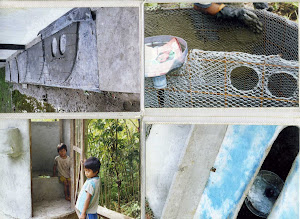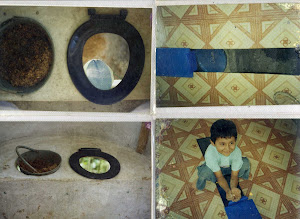Fundación In Terris recibe US$100,000 del programa "Grand Challenges Explorations" (Explorando Grandes Retos) para investigación innovadora que ayudará a promover Salud y Desarrollo.
La Fundación In Terris de Guayaquil anunció hoy que es uno de los ganadores de "Grand Challenges Explorations", una iniciativa de la Fundación Bill & Melinda Gates . El ecuatoriano Marcos Fioravanti, junto a los estadounidenses Chris Canaday y Charles Henry, investigadores en saneamiento y desarrollo sostenibles desarrollarán una innovadora investigación para promover la salud global, trabajando durante 18 meses en el desarrollo de un sanitario eco-eficiente que no usará agua ni energía y producirá abono para plantas, mediante un mecanismo simple, económico, seguro y agradable para el usuario.
"Grand Challenges Explorations" (GCE) entrega fondos a científicos e investigadores alrededor del mundo, que exploren ideas que rompan los esquemas sobre cómo enfrentar los retos globales en salud y desarrollo. Fioravanti, Canaday y Henry son uno de los 85 grupos de investigadores beneficiados en la sexta ronda de GCE, anunciados el pasado 28 de abril por la Fundación Bill & Melinda Gates.
"Los ganadores de GCE están expandiendo la gama de ideas para los más serios retos mundiales en cuanto a salud y desarrollo, en los que el pensamiento creativo es lo que se necesita más urgentemente. El propósito de estos fondos es impulsar nuevos descubrimientos que podrían finalmente salvar millones de vidas" dijo Chris Wilson, director de Descubrimientos en Salud Global de la Fundación Bill & Melinda Gates.
Para ganar estos fondos, Fioravanti y sus colegas, y el resto de ganadores, debieron demostrar sus audaces propuestas mediante una aplicación en línea de dos páginas, enfocándose en uno de los siguientes cinco ámbitos relacionados a salud y desarrollo: erradicación del polio, VIH, tecnologías de saneamiento y salud familiar y tecnologías móviles para la salud. Aplicaciones para la Séptima Ronda de GCE serán recibidas hasta el 19 de mayo próximo.
Fioravanti, Canaday y Henry llevan más de 10 años investigando alternativas de saneamiento sostenible, que permitan deshacernos de manera segura de nuestros desechos, y a la vez eviten el desperdicio de recursos naturales. "Los sanitarios convencionales son muy cómodos y agradables al momento del uso y fueron viables en una época en la que fuimos menos en este planeta y nuestros recursos naturales eran más abundantes; pero desperdician y contaminan grandes volúmenes de agua limpia, consumen mucha energía, y depositan nuestros nutrientes en los océanos" comenta Fioravanti. "El 40% de la población del planeta, 2.800 millones de personas, no tienen acceso a saneamiento básico, pero a la vez 1.000 millones no tienen acceso al mínimo recomendado de agua pura; ese es el reto… ¿cómo solucionar el primer problema, sin agudizar más aún el segundo?... y eso es lo que podremos ofrecer al mundo al desarrollar un prototipo de sanitario eco-eficiente, económico y funcional" agrega el ecuatoriano. "No se trata sólo de una solución ambiental, siendo una de las maneras más fáciles de reducir nuestra huella ecológica", Canaday explica, "sino también una gran herramienta para la prevención de las numerosas enfermedades presentes en la contaminación fecal, que están entre las tres principales causas de muerte en el mundo. Además, este inodoro nos permitirá aumentar la seguridad alimenticia al regresar los nutrientes al suelo en forma de abono inocuo, sin reducir nuestra privacidad, dignidad o confort", menciona el biólogo.
Los tres investigadores ya tienen varios prototipos desarrollados y probados. Henry, quien es profesor en la Universidad de Washington, explica que ahora trabajarán "en consolidar sus ideas mediante un diseño altamente funcional que resuelva dos obstáculos importantes. El primero es hacerlo agradable, cómodo y seguro para el usuario; y el segundo es que sea económico, y esté al alcance de los más pobres". Menciona además que están "interesados en establecer conversaciones con universidades, para identificar oportunidades de colaboración en el monitoreo de ciertos parámetros; y con empresas privadas industriales y financieras para identificar posibles sinergias en esquemas de producción en serie (posiblemente incluyendo el reciclaje de plástico) y financiamiento para que la tecnología esté al alcance de todos; así mismo, sería clave conversar con el sector público sobre la aplicación de este nuevo sanitario sostenible".
Sobre "Grand Challenges Explorations"
Grand Challenges Explorations es una iniciativa de US$100 millones financiada por la Fundación Bill & Melinda Gates. Lanzado en el 2008, el programa de fondos Grand Challenge Explorations ya ha financiado casi 500 investigadores de más de 40 países. El programa de fondos está abierto a cualquier persona, de cualquier disciplina y cualquier organización. La iniciativa utiliza un ágil y acelerado proceso de entrega de fondos, mediante un formato de aplicación de dos páginas, sin información previa requerida. Se entregan "financiamientos iniciales" de US$100mil dos veces por año. Además, aquellos proyectos que sean exitosos, tienen la opción de aplicar a un fondo de hasta US$1 millón para continuar su investigación.
Sobre Fundación In Terris (http://www.balandra.edu.ec/interris/)
Es una fundación que promueve el desarrollo sostenible de los sectores periurbanos y rurales con el fin de combatir la migración del campo a la ciudad y las consecuencias que este fenómeno acarrea. Para ello desarrolla proyectos de dotación de infraestructura y capacitación, de la mano del Comité de Padres de Familia del Centro Educativo Balandra – Cruz del Sur. En el 2008 instaló el primer baño ecológico de la mano de Fioravanti y Henry; desde entonces ha entregado varios prototipos a familias pobres de comunidades periurbanas de Guayaquil y establecieron una alianza para desarrollar microempresas en esta línea.
Un artículo sobre esta beca en El Expreso de Guayaquil:
http://semana.expreso.ec/html/notas.asp?codigo=20110522171746La página de la Fundación Gates sobre esta y otras becas sobre el saneamiento:
http://www.grandchallenges.org/explorations/Pages/grantsawarded.aspx?Topic=Create%20the%20Next%20Generation%20of%20Sanitation%20Technologies&Round=all&Phase=all
- - -
A Grant from the Gates Foundation
"In Terris" Foundation Receives US$100,000 Grand Challenges Explorations Grant for Ground-Breaking Research in Global Health and Development
The In Terris Foundation of Guayaquil announced today that it is a Grand Challenges Explorations winner, an initiative funded by the Bill & Melinda Gates Foundation. The Ecuadorian Marcos Fioravanti, together with Chris Canaday and Charles Henry of the United States, researchers in sustainable sanitation, will pursue an innovative global health and development research project, titled "The Earth Auger Toilet: Innovation in Waterless Sanitation". They will have 18 months to develop and test an eco-efficient toilet that does not use water or electricity, and instead produces fertilizer for plants, via a simple, economical, and safe mechanism, which is also pleasant for the user.
Grand Challenges Explorations (GCE) funds scientists and researchers worldwide to explore ideas that can break the mold in how we solve persistent global health and development challenges. Fioravanti, Canaday and Henry's project is one of over 85 Grand Challenges Explorations Round 6 grants announced today by the Bill & Melinda Gates Foundation.
"GCE winners are expanding the pipeline of ideas for serious global health and development challenges where creative thinking is most urgently needed. These grants are meant to spur on new discoveries that could ultimately save millions of lives," said Chris Wilson, director of Global Health Discovery at the Bill & Melinda Gates Foundation.
To receive funding, Fioravanti et al. and other Grand Challenges Explorations Round 6 winners demonstrated in a two-page online application a bold idea in one of five critical global heath and development topic areas: polio eradication, HIV, sanitation and family health technologies, and mobile health. Applications for the current open round, Grand Challenges Explorations Round 7, will be accepted through May 19, 2011.
Fioravanti, Canaday and Henry have been researching sustainable alternatives for sanitation for over 10 years, which allow us to do away with our wastes safely without wasting natural resources. "Conventional toilets may be very comfortable and were viable in an epoch in which there were fewer people on the planet and our natural resources were more abundant, but they waste and contaminate large amounts of water, consume a great deal of energy, and deposit our nutrients in the oceans" says Fioravanti. "Forty percent of the world's population, 2.8 billion people, have no access to basic sanitation and at the same time one billion lack adequate access to safe water; so that is the challenge… how to solve the first problem, without making the second one worse?... and that is what we intend to offer to the world, by developing a functional, economical and eco-efficient toilet" adds the researcher. "This is not just a matter of an environmental solution, being one of the easiest ways to reduce our ecological footprint", explains Canaday, "but also a great tool to prevent the numerous diseases present in fecal contamination, which are among the three main causes of death in the world. Furthermore, this toilet will increase our food security, by returning nutrients to the soil in the form of innocuous fertilizer, without reducing our privacy, dignity or comfort", mentions the biologist.
The three researchers have several proven prototypes. Henry, who is a professor at the University of Washington, explains that they will now work "to consolidate these ideas via a highly functional design that resolves two important obstacles. The first is for it to be presentable, comfortable and safe for the user, and the second is for it to be economical and accessible for the poorest people". He also mentions that they are "interested in establishing conversations with universities, to identify opportunities for collaboration in monitoring certain parameters (including the die-off of pathogens), and with private industrial and financial companies to identify possible synergies for mass production (possibly including plastic recycling) and financing schemes such that this technology may be accessible to all. In the same way, it would be important to discuss with government entities about the instalation of this new, sustainable toilet".
About Grand Challenges Explorations
Grand Challenges Explorations is a US$100 million initiative funded by the Bill & Melinda Gates Foundation. Launched in 2008, Grand Challenge Explorations grants have already been awarded to nearly 500 researchers from over 40 countries. The grant program is open to anyone from any discipline and from any organization. The initiative uses an agile, accelerated grant-making process with short two-page online applications and no preliminary data required. Initial grants of $100,000 are awarded two times a year. Successful projects have the opportunity to receive a follow-on grant of up to US$1 million.
About the In Terris Foundation (http://www.balandra.edu.ec/interris/)
It promotes sustainable development in periurban and rural areas, in order to combat migration from the countryside to the city, with all of the consequences that come with this. For this reason, it carries out training and infrastructural projects, together with the parents association Balandra – Cruz del Sur.School. In 2008, they built their first ecological toilet, together with Fioravanti and Henry. Since then, they have built several more for families in outlying neighborhoods of Guayaquil and have established an alliance to develop related microenterprises.
An article about this grant came out in the El Expreso newspaper of Guayaquil:
http://semana.expreso.ec/html/notas.asp?codigo=20110522171746A webpage of the Bill and Melinda Gates Foundation lists this and other grants related to sanitation:
http://www.grandchallenges.org/explorations/Pages/grantsawarded.aspx?Topic=Create%20the%20Next%20Generation%20of%20Sanitation%20Technologies&Round=all&Phase=all






